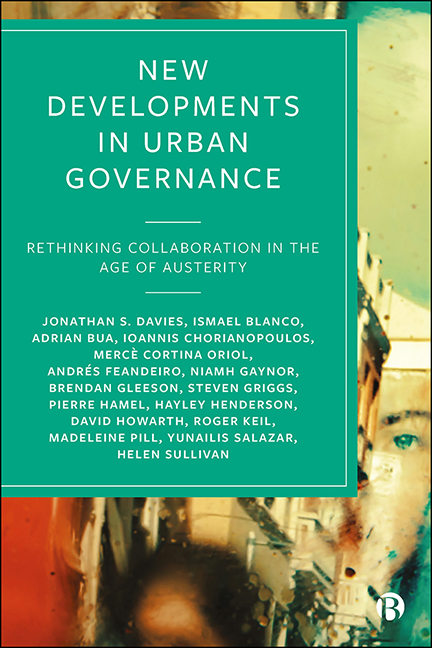Book contents
- Frontmatter
- Contents
- List of Figures and Tables
- Acknowledgements
- Introduction
- 1 Crisis and Austerity in Eight Cities: An Overview
- 2 Collaborative Governance After the Global Economic Crisis
- 3 Austerity Governance, Political Resistance and Urban Transformation
- 4 Rescaling through Austerity Governance
- 5 The Local State in Austerity Governance
- 6 Urban Cultural Diversity and Economic Migration in Austere Times
- 7 Conclusion
- Afterword: From Austerity to COVID-19 and Beyond
- Notes
- References
- Bibliography of Working Papers
- Index
2 - Collaborative Governance After the Global Economic Crisis
Published online by Cambridge University Press: 15 September 2022
- Frontmatter
- Contents
- List of Figures and Tables
- Acknowledgements
- Introduction
- 1 Crisis and Austerity in Eight Cities: An Overview
- 2 Collaborative Governance After the Global Economic Crisis
- 3 Austerity Governance, Political Resistance and Urban Transformation
- 4 Rescaling through Austerity Governance
- 5 The Local State in Austerity Governance
- 6 Urban Cultural Diversity and Economic Migration in Austere Times
- 7 Conclusion
- Afterword: From Austerity to COVID-19 and Beyond
- Notes
- References
- Bibliography of Working Papers
- Index
Summary
Introduction
As the introductory chapter explained, collaboration was popularized as an idea across much of the globe in the 1990s and 2000s, including the Global South, and was considerably influenced by international actors and donor non-governmental organizations (NGOs) as well as ideas circulating through nation states about modernizing public governance and management. From the basis of multiple definitions and mixed practices of collaborative governance, this chapter explores trends found through the comparative study of our eight cities, in the decade after the GEC. We aim to examine the impact of austerity on localized collaborative structures of policymaking. Specifically, the chapter elaborates three dimensions where interesting comparisons and contrasts were identified: in discourse, in agency and in the spaces utilized to facilitate alliance building and joint working. Trends in discourse, agency, and spaces of collaboration after the GEC are linked to the historical events and traditions highlighted in the introductory chapter.
Collaboration as a state-led discourse
With the exception of Baltimore (Pill, 2020), the state played a leading role in fomenting collaborative governance discourses across the cases, though not necessarily an exclusive role. There were three cases in which the dominant discourse about governance was crafted strongly at the national level: Athens, Dublin and Leicester. All three cities had a heavily centralized mode of governance which defined local relational dynamics more compared with the other cities in this study. While local democracy rescaling and devolution of responsibilities have been part of reform programmes across these centres stemming back to the 1980s (see Chapter 4 for more detail), budget cuts have at the same time meant that local governments were not equipped to absorb new responsibilities, including the leadership of participation. In turn, the weak position of local governments meant that national governments (and their financiers) continued to set policy parameters and collaboration was narrowly conceived at the local level as a necessary mode of policy delivery, though not of policy definition.
Post-GEC, austerity provided an opportunity to reframe governance discourses in a way that consolidated and extended the reach of neoliberal restructuring, including accelerating processes of decentralization, wage freezes, employment terminations and greater emphases on partnering with NGOs with an ability to attract resources and deliver services with efficiency dividends.
- Type
- Chapter
- Information
- New Developments in Urban GovernanceRethinking Collaboration in the Age of Austerity, pp. 31 - 49Publisher: Bristol University PressPrint publication year: 2022



